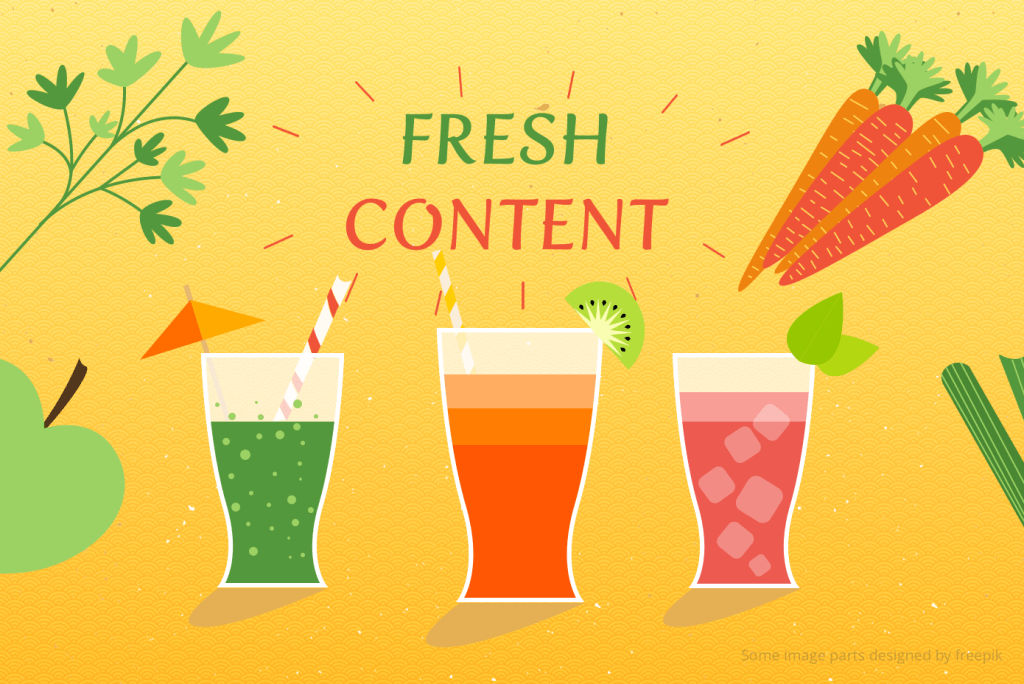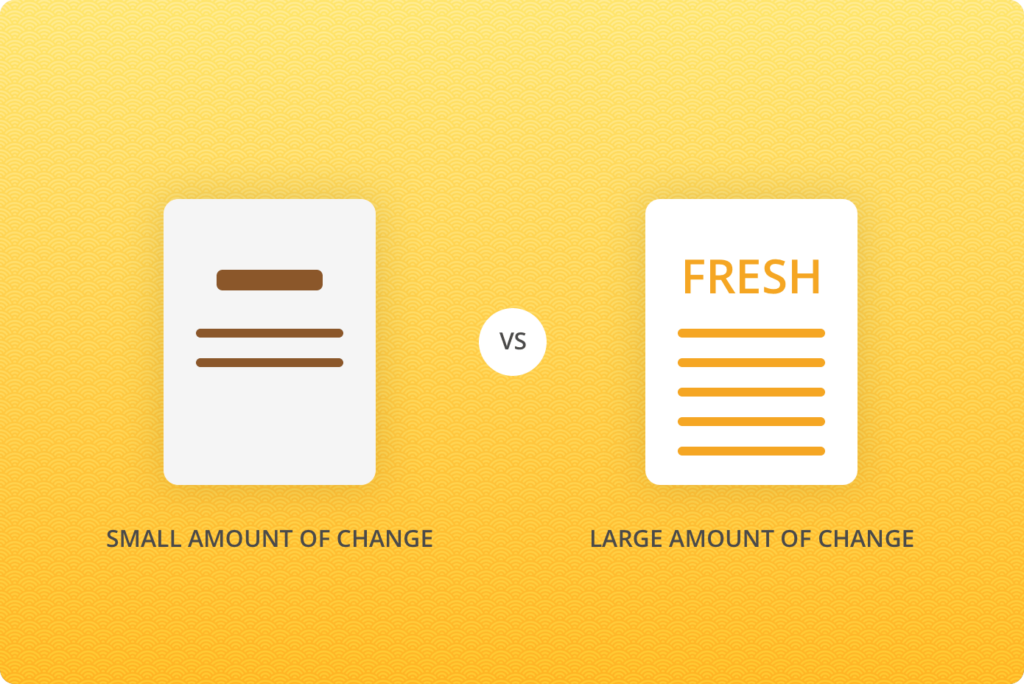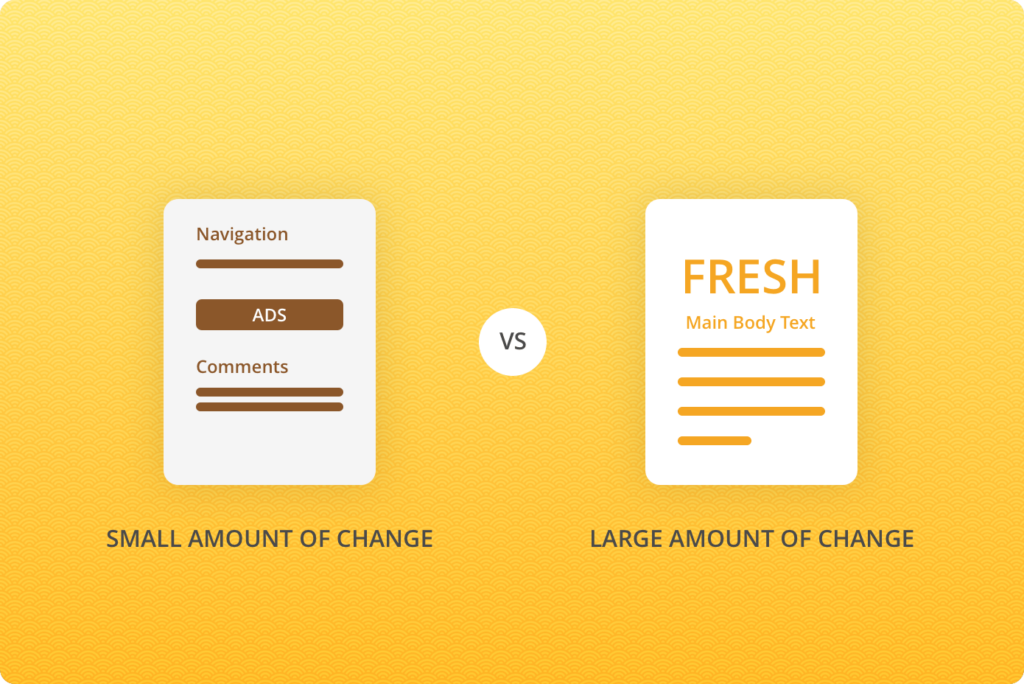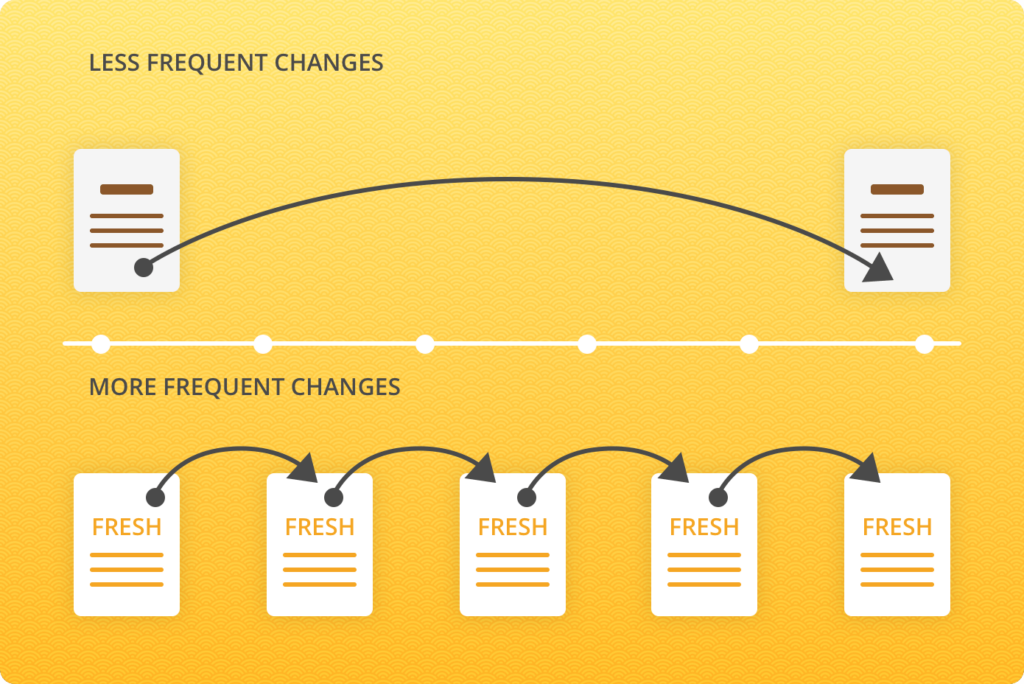Online store owners may face a problem with content updates. On the one hand, there is a recommendation to publish fresh content regularly.
On the other hand, there are a lot of static pages in an online store with relevant information which does not need to be updated.
Let’s take a closer look at this problem and try to identify what should be updated, how often and why it is important.
Does Google Like Fresh Content?
In fact, it is not a whim of Google but rather a requirement of users. For example, if you are looking for information about the UEFA European Championship, you would probably prefer the results about EURO 2017, not about EURO 2012. That is why Google Search has a freshness algorithm developed to provide you with the most relevant and fresh results, so even if you only search for “EURO football” without specifying the year 2017, you will find EURO 2017 on SERP.
You could say that it is a hot topic and popular event, so it is understandable that the information regarding it is updated every day, hour and even minute. You are right. But if you search for “iPhone reviews” you probably will not be satisfied with the reviews that were published 4 years ago. You also prefer to receive the most up to date information. So, relevance and freshness of information is a requirement of users that Google is trying to satisfy. Read more information on the official Google blog.
We previously mentioned that one of the advantages of blogging is that it helps to update information. But what should you do with product pages? If you have a permanent product range and there are no new items in the store, is it possible to make the content fresh? Below we will describe how Google analyzes content for freshness.
A date of a document creation
The first parameter by which Google determines fresh content is the date on which the document was created. It also can be the date when the document is found by Google for the first time, in other words, when Googlebot indexes a certain document or finds a link to it.
A good freshness indicator may boost certain content for some search requests, but this effect may be temporary, and the older a document gets – the worse positions it takes in search results. For some requests, older web pages may be preferred to newer ones. And so, it may be useful to correct the freshness indicator for a certain webpage based on the difference between the age of the document and the number of available results. More information here.
The number of changes determines the degree of freshness
The age of a document is not the only indicator of freshness. Search engine crawlers are able to index and check the changes in each document. So, the number of changes in a document can make certain content fresher or older.
For instance, if you change several words or add a small text paragraph on the page, this content will not be considered as fresh. Practice shows that in most cases Google ignores minor changes.
SEO Tip. If you update a link on an existing webpage, it is better to change the text surrounding this link, as well. In this case, Google is more likely to consider this as update and not to ignore your changes.
Where or what part of a document is changed
Each webpage has different areas and its own structure, and an update is more or less important depending on which part or which elements of the page this update affects. The most preferred part of the changes in the body of the page. Changes in comments, advertising blocks, navigation, Javascript, date and time are less important.
SEO Tip. Don’t try to make fake freshness. The best way is to keep the existing page content fresh and useful at the same time.
Changes in fresh content frequency or how often content is changed
Updating content regularly is not enough. If you do this once a year it is also considered regularly updated. Content that is updated more often is considered differently than content that is updated several times per year. But, you should take into account that Google “understands” that there are sites where information is updated constantly (for example, a news portal like bbc.com and so on) and there are sites where frequent updates are not appropriate and may even be suspicious. Moreover, Google treats the links of such pages in a different way. The links value from the rapidly changing (updating) pages may not be as strong as the links from static, permanent pages.
Adding new pages
You can refresh existing pages, as well as create new ones. A very simple formula works here: sites that create new pages more often may have a higher freshness indicator than sites that create new pages less frequently.
Freshness may also be identified as the ratio of fresh pages compared to existing pages during a certain period of time. Because of this, it is recommended to add about 30% fresh pages to the site every year. But it is not obvious if other freshness signals exist.
Increase in the number of new backlinks
Not only external factors can make content fresh. There are also external factors that can be even more powerful. If the number of backlinks to a certain page is increasing it is a signal of fresh content.
SEO Tip. A false increase of backlinks can be considered by search engines as spam or black SEO. Search engines can penalize for such activity. Keep in mind that backlinks from sites that have a good freshness indicator can improve the freshness indicator of the pages they link to.
Recommendations for e-commerce
Online stores have a lot of peculiarities in their content. Some product pages don’t need frequent updates and the information can be relevant for several months. You don’t need to update your online store pages to receive better ranking results. The main goal here is to update information to make the content as useful for visitors as possible. Here are some recommendations:
- Determine an optimal updated rate for your business. Check how often your competitors are updating the information. According to this, add new content to your online store regularly.
- Use your blog to add useful content. It is the best practice for the online store to create new pages.
- When you upgrade, engage more important parts and elements of the site. Remember that the body of the page is preferable.
- Remember that slight changes may not be considered. To update a link, you need to change the text surrounding the link to increase the probability of the link to be considered as fresh.
- Stable backlink growth is better than sharp and intermittent growth.
- Plan and update the product page content, but keep in mind that frequent updates are not needed here.
In conclusion, it should be noted that you need to think about your clients first and do your best to be useful and relevant to them. Googlebot will never buy your products, so your priorities should be clearly identified.







